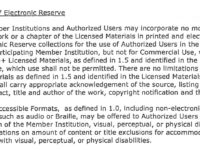“Free” materials for educational purposes are sometimes derided as sub-standard works based on the premise that you get what you pay for. Inherent in the argument is that value is associated with cost and that turning to materials without cost means relying on materials without value. Yet the reality is that free materials are free as in “freely available” with the costs of production or business models that support those works rivalling conventional publication approaches. Free or openly available materials are not outliers. For example, the University of Guelph told the Industry committee that 24 per cent of materials in their course management systems consisted of open or free online content.
The series on misleading on fair dealing continues with an examination of freely available materials, including four sources: public domain works, open educational resources, open access publishing, and hyperlinking to third party content (prior posts in the series include the legal effect of the 2012 reforms, the wildly exaggerated suggestion of 600 million uncompensated copies each year, the decline of books in coursepacks, the gradual abandonment of print coursepacks, the huge growth of e-book licensing, why site licences offer better value than the Access Copyright licence, my opening remarks to the Standing Committee on Canadian Heritage, and transactional licensing).











